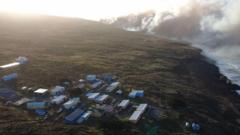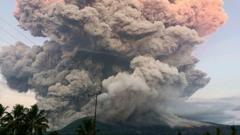**The ongoing fires, fueled by dry conditions and strong winds, have engulfed over half of the island's area, forcing researcher evacuations and threatening unique ecosystems.**
### Wildfires Devastate Amsterdam Island, Impacting Biodiversity and Research

### Wildfires Devastate Amsterdam Island, Impacting Biodiversity and Research
**Severe wildfires on Amsterdam Island in the Indian Ocean raise concerns over wildlife and scientific research.**
---
In a devastating turn of events, Amsterdam Island, a French territory located in the southern Indian Ocean, has been ablaze for nearly a month, affecting over 55% of its 54 square kilometers. This remote island, situated equidistant from Australia, Antarctica, and Madagascar, is uninhabited by permanent residents but hosts a scientific research station that has been operational since the 1980s.
The wildfires erupted near the Pointe Bénédicte observatory on January 15, discovered by an atmospheric researcher. Following the outbreak, 31 individuals were evacuated to Réunion Island for their safety. French authorities quickly mobilized to control the extensive blaze and evaluate the extent of the damage.
Rémi Chazot, a computer scientist at the research facility, expressed gratitude that a lobster fishing vessel, Austral, had been nearby, stating, "This boat should have left a week earlier, but it had not caught its lobster quota." Had the vessel not been in the area, the outcome could have been far more perilous.
The fires have spread across the island partly due to its network of peat bogs, dry conditions, and relentless winds that can reach speeds of 40 km/h (24 mph). While the evaluation of extensive damage is ongoing, satellite images indicate that the fires have impacted the island’s renewable energy infrastructure, food supplies, and communication lines.
The island's unique biodiversity is also at risk. Known for its exceptional wildlife, Amsterdam Island serves as a breeding ground for several seal species, various albatrosses—including the Amsterdam Albatross, which breeds exclusively on the island—and a colony of Southern rockhopper penguins. With its remote location and minimal pollution, the area has been crucial for atmospheric research over the last 45 years.
As scientists work to secure the area, they express concerns over the suspension of research activities, which will result in a significant data gap. Marc Delotte, the director of the Laboratory for Climate and Environmental Sciences (LCES), noted, "This pause will mean quite a lack of data acquisition for our research. It's not good news for such a unique location."
On February 7, a reconnaissance mission aboard a French navy vessel was launched, comprising firefighters and technical personnel aimed at assessing the chaos caused by the wildfires. Their objectives extend beyond extinguishing the flames; they will also investigate the fire’s origins and work on restoring the island's essential energy and water systems.
In a devastating turn of events, Amsterdam Island, a French territory located in the southern Indian Ocean, has been ablaze for nearly a month, affecting over 55% of its 54 square kilometers. This remote island, situated equidistant from Australia, Antarctica, and Madagascar, is uninhabited by permanent residents but hosts a scientific research station that has been operational since the 1980s.
The wildfires erupted near the Pointe Bénédicte observatory on January 15, discovered by an atmospheric researcher. Following the outbreak, 31 individuals were evacuated to Réunion Island for their safety. French authorities quickly mobilized to control the extensive blaze and evaluate the extent of the damage.
Rémi Chazot, a computer scientist at the research facility, expressed gratitude that a lobster fishing vessel, Austral, had been nearby, stating, "This boat should have left a week earlier, but it had not caught its lobster quota." Had the vessel not been in the area, the outcome could have been far more perilous.
The fires have spread across the island partly due to its network of peat bogs, dry conditions, and relentless winds that can reach speeds of 40 km/h (24 mph). While the evaluation of extensive damage is ongoing, satellite images indicate that the fires have impacted the island’s renewable energy infrastructure, food supplies, and communication lines.
The island's unique biodiversity is also at risk. Known for its exceptional wildlife, Amsterdam Island serves as a breeding ground for several seal species, various albatrosses—including the Amsterdam Albatross, which breeds exclusively on the island—and a colony of Southern rockhopper penguins. With its remote location and minimal pollution, the area has been crucial for atmospheric research over the last 45 years.
As scientists work to secure the area, they express concerns over the suspension of research activities, which will result in a significant data gap. Marc Delotte, the director of the Laboratory for Climate and Environmental Sciences (LCES), noted, "This pause will mean quite a lack of data acquisition for our research. It's not good news for such a unique location."
On February 7, a reconnaissance mission aboard a French navy vessel was launched, comprising firefighters and technical personnel aimed at assessing the chaos caused by the wildfires. Their objectives extend beyond extinguishing the flames; they will also investigate the fire’s origins and work on restoring the island's essential energy and water systems.






















